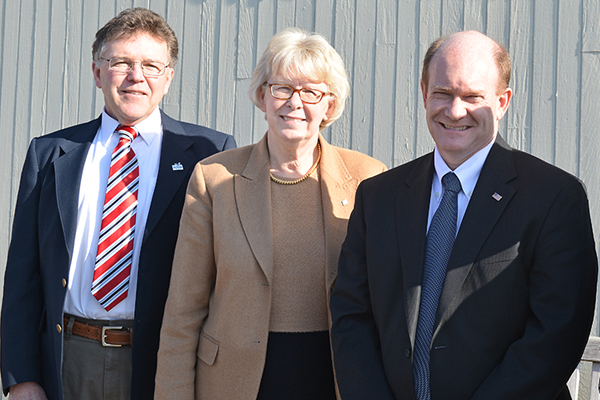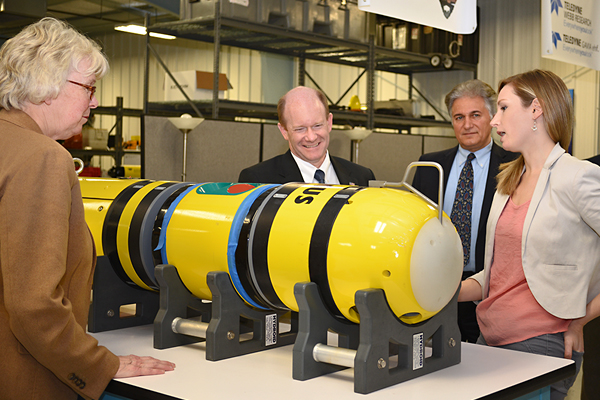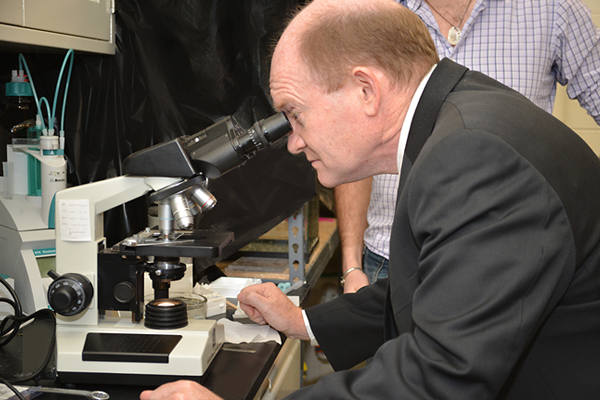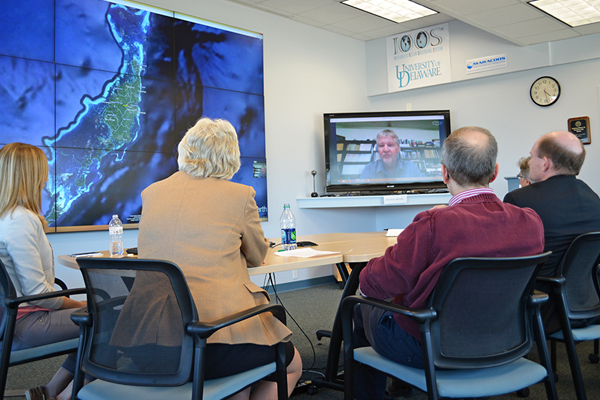

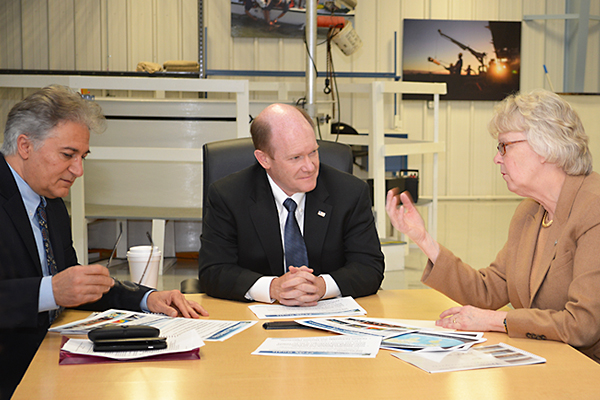
Senator visits Sharp Campus
CEOE briefs senator on work in coastal resilience, environmental technology
10:43 a.m., April 10, 2015--U.S. Sen. Chris Coons toured the University of Delaware Hugh R. Sharp Campus in Lewes on Wednesday, April 1, to learn about the College of Earth, Ocean, and Environment’s (CEOE) strategic work in the areas of climate change, coastal resilience and environmental technology.
CEOE Dean Nancy Targett expressed that that the college’s research in these fields is crucial to understanding the changing environment.
Research Stories
Chronic wounds
Prof. Heck's legacy
“Our researchers study climate all over the world to help determine what climate change means for humans and the environment,” Targett said. “This work places UD in a strategic position not only to contribute scientific data to this broader conversation but, even more importantly, to develop useful tools to better help communities to plan, prepare and respond. It was a privilege to share this information with Sen. Coons.”
Research on coastal resilience and environmental technology are important to understanding a variety of environmental issues, including the complex, multi-faceted study of global climate change. Anticipated effects of climate change vary widely, and include ocean acidification, rising global temperatures and sea level rise, all of which could jeopardize sea life, coastal communities and water resources.
Coons heard from UD researchers conducting global research from the tropics to the polar regions, including studies centering on the steady climate change effects on coral reefs, polar oceans and sea ice.
UD post-doctoral researcher Thomas Hawkins described his work studying sea anemones, which share many of the same properties and characteristics of coral, as a means to understand how global temperature rise will affect coral reefs.
Effects of climate change on oceans carry important implications for Delaware; as America’s flattest state — with a mean elevation of only 60 feet — Delaware is also more susceptible to climate-induced sea level rise than other states.
Dan Leathers, state climatologist and UD professor of geography, demonstrated the Delaware Environmental Observing System and the Delaware Coastal Flood Monitoring System, two UD-developed coastal resilience tools that provide emergency planners and the public important resources to plan for weather related or coastal flood events.
Similarly, Jim Falk, acting director of the Delaware Sea Grant College Program (DESG), spoke about DESG’s outreach in the area of coastal resiliency.
Regionally, UD has leveraged its expertise in climate science efforts as a major partner in the Mid-Atlantic Coast Resilience Institute (MACRI) and Maryland and Delaware Climate Change Assessment and Research (MADE CLEAR).
“It was great to learn about the many studies and issues researchers in UD’s College of Earth, Ocean, and Environment are tackling in the areas of climate change and coastal resilience,” said Coons. “We’re really fortunate to have these talented researchers, led by Dean Nancy Targett, focusing on the future of our Earth and environment.”
The tour culminated in CEOE’s Global Visualization Laboratory, with Mark Moline, director of the School of Marine Science and Policy, joining the conversation from the Republic of Palau, where he has been conducting fieldwork since 2010.
Moline and Scripps Oceanographic Institute colleague Eric Terrill have been studying and modeling the complex flow of water around the coral reefs, lagoons and islands of Palau, with funding from the U.S. Office of Naval Research (ONR).
In particular, the researchers are examining currents, large-scale eddies and tides’ impact on water movement, and how super-typhoons affect beaches and coral reef environments, which are an important ecosystem for marine plants, fish and other organisms.
Moline expressed to Coons that, while the coral in the study area was “fairly resilient,” storm frequency presents a major challenge to the corals’ wellbeing. According to the U.S. Environmental Protection Agency, storm surges are expected to increase in strength and frequency as a result of human-induced climate change, meaning that this research is more crucial than ever to understanding ecological systems like coral reefs.
“When coral meets these challenges, it has difficulty coming back,” said Moline, reiterating the permanent impact that climate change can produce if left unchecked.
Moline and Terrill’s ONR-funded research has also provided the opportunity to use their robotic technologies on a multi-disciplinary research team that recently discovered a U.S. Navy Curtiss SB2C Helldiver aircraft lost more than 70 years ago in World War II. The research team discovered two other U.S. aircraft in 2014.
The remains of those two aircraft are now slated for recovery by the U.S. Defense POW/MIA Accounting Agency (DPAA), the agency responsible for recovery and identification of remains and the notification of families, illustrating the many uses and advantages of environmental technology.
Article by Karen B. Roberts




